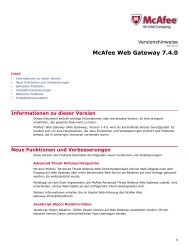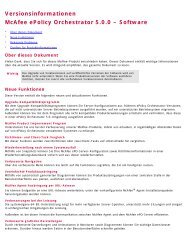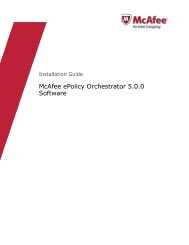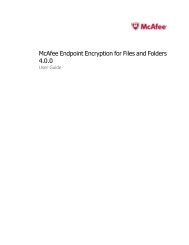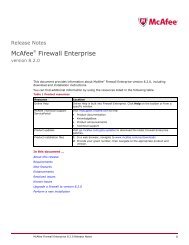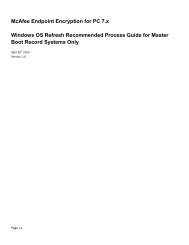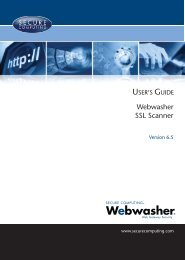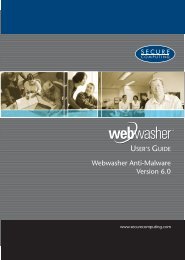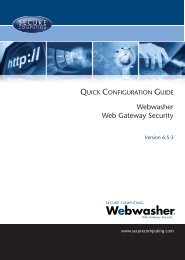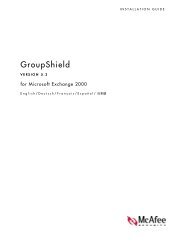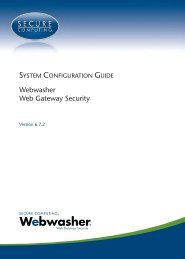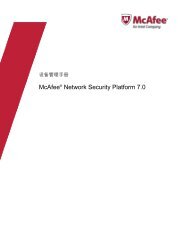VirusScan for Linux 1.7 Best Practices Guide - Errors - McAfee
VirusScan for Linux 1.7 Best Practices Guide - Errors - McAfee
VirusScan for Linux 1.7 Best Practices Guide - Errors - McAfee
Create successful ePaper yourself
Turn your PDF publications into a flip-book with our unique Google optimized e-Paper software.
5<br />
Product Configurations<br />
Run-time kernel modules<br />
To recover a particular quarantined item<br />
1 From the terminal, login as root.<br />
2 Run the following command:<br />
/opt/NAI/<strong>Linux</strong>Shield/bin/nails quarantine ‑recover <br />
For example, if you want to recover file1 which is listed as quarantined item , you need to run the<br />
command as: /opt/NAI/<strong>Linux</strong>Shield/bin/nails quarantine ‑recover<br />
/quarantine/QXXX.XXXXXX.XXXXX.XXX.meta /tmp/file1<br />
This will restore file1 into/tmp directory.<br />
Run-time kernel modules<br />
Automatic support <strong>for</strong> new kernels released from the distribution vendors without any downtime in<br />
On‑access scanning. <strong>McAfee</strong> <strong>VirusScan</strong> Enterprise <strong>for</strong> <strong>Linux</strong> Kernel modules will be created dynamically<br />
in case of a mod‑version failure.<br />
• You must have developer utilities such as make or gcc installed on your machine along with kernel<br />
headers package of the current kernel. If mod‑versioning fails during nails service start, the kernel<br />
modules gets compiled dynamically and on‑access scanner gets enabled.<br />
• If developer utilities are not installed in your production server, you can compile the kernel modules<br />
on a staging server and run the export command to archive the kernel modules. Import the kernel<br />
modules on to your production server by running the import command. For more in<strong>for</strong>mation,<br />
please refer the <strong>McAfee</strong> <strong>VirusScan</strong> Enterprise <strong>for</strong> <strong>Linux</strong> <strong>1.7</strong> — Product <strong>Guide</strong>.<br />
• · Ensure that the kernel sources/headers and developer tools are installed on the computer. If the<br />
kernel sources/headers are installed in a non‑default location, set the KERNEL_HEADER_LOCATION<br />
environment variable be<strong>for</strong>e compilation.<br />
• You can check if the compiled or imported kernel modules are working properly by executing the<br />
command: /opt/NAI/<strong>Linux</strong>Shield/bin/khm_setup ‑t<br />
To view the logs, go to: /opt/NAI/<strong>Linux</strong>Shield/src/log<br />
Third-party software coexistence<br />
• <strong>VirusScan</strong> Enterprise <strong>for</strong> <strong>Linux</strong> does not support coexistence with backup software such as<br />
ArcServe, Cava Agent, bacula backup software and so on. Hence <strong>McAfee</strong> recommends you to<br />
exclude directories or files associated with it.<br />
• There are few compatibility issues between <strong>McAfee</strong> <strong>VirusScan</strong> Enterprise <strong>for</strong> <strong>Linux</strong> and <strong>McAfee</strong><br />
Solidcore. Please refer the following KnowledgeBase articles <strong>for</strong> the resolution of these issues.<br />
• https://kc.mcafee.com/corporate/index?page=content&id=KB70194<br />
• https://kc.mcafee.com/corporate/index?page=content&id=KB70857<br />
You can also log on to https://kc.mcafee.com and search using the KB article number.<br />
18 <strong>McAfee</strong> <strong>VirusScan</strong> Enterprise <strong>for</strong> <strong>Linux</strong> <strong>1.7</strong>.0 <strong>Best</strong> <strong>Practices</strong> <strong>Guide</strong>



